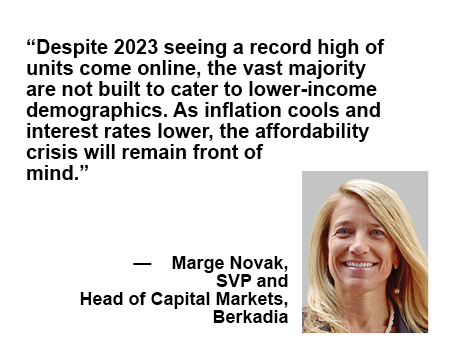Multifamily & Affordable Housing Business sat down with Marge Novak, senior vice president and head of Capital Markets at Berkadia, for a question-and-answer discussion about the current state of the affordable housing market and the challenges likely to influence 2024.
Multifamily & Affordable Housing Business: How is the affordable housing market faring in the current economic conditions?
Novak: With increased inflation and interest rates, home prices hit all-time highs, making them less affordable than at the height of the 2006 housing bubble. While buyers waited for prices to fall, sellers weren’t listing homes as they chose to not sacrifice their low mortgage rates, which rose in the fastest and most aggressive rate hiking cycle in 40 years. With fewer people able to purchase homes due to mounting interest rates, demographics including millennials and Gen Zers continue to drive the renting pool across the country. According to Berkadia’s 2024 Outlook Powerhouse Poll, the most active renters across the United States are millennials (58 percent), with Gen Z (30 percent) coming in as a close second.
Demand for rental units remains strong while supply is still a bit restricted. Despite 2023 seeing a record high of around 565,200 new apartment units come online and 2024 being forecast to surpass that number at around 670,071 units scheduled to arrive by year-end, the vast majority of the new units are not built to cater to lower-income demographics. As inflation cools and interest rates lower, the affordability crisis will remain front of mind.
Multifamily & Affordable Housing Business: What is the appetite for acquisitions and what does it take to get deals across the finish line? What are the biggest challenges?
Novak: With less liquidity in the market, stakeholders are increasingly disciplined, while underwriting requirements and insurance considerations are more critical than ever. However, there is an undeniable gap between seller expectations and what buyers are willing to pay. Though the market still has healthy competition, everyone agrees that there is a level of transparency between buyers, sellers and investors to exchange industry insights and solutions. For anybody specializing in affordable housing — buyers, sellers and investors alike — the importance of uniting behind a larger mission to solve the affordability crisis cannot be understated.
In terms of deal closings, the number of Low-Income Housing Tax Credit (LIHTC) deal closings in 2024 is likely to look similar to 2023. Any tax reform, if passed this year, would likely not result in more deal closings until 2025 at the earliest, given general timelines for tax credit applications, allocations and deal closings for any such new credit authority.
Multifamily & Affordable Housing Business: What are the biggest challenges with new construction or redevelopments?
Novak: The investor market is susceptible to potential weakening influenced by various factors that may affect demand. These factors include the escalation of the cost of funds, the lingering impact of project pipeline carryover from the previous year and a potential shift in investor appetite toward alternative tax credits, such as those related to energy projects. Though the economy has begun to look more stable in the past month, fewer active lending sources, high interest rates, high labor costs and high materials costs add to the complexity of pursuing ground-up affordable developments. Additionally, restrictive zoning laws and costly permitting fees act as barriers to entry for many investors.
Multifamily & Affordable Housing Business: Where do you see the affordable housing market heading in 2024? How will Fed policy impact the market in the next 12 to 24 months?
Novak: The persistent shortage of affordable housing options exacerbates the financial burden on vulnerable households, often forcing them to allocate an unsustainable portion of their income to housing expenses. Even though this disparity won’t be fixed in the short term, and these trends will inevitably extend into 2024, concerted efforts are needed to develop targeted policies that prioritize the creation of affordable housing units that accommodate the needs of low-income families.
If the Fed starts rate cuts this year, as policymakers and market participants project, mortgage rates will continue to adjust, and pent-up housing demand could be unleashed. A sudden increase, as the result of rapid rate cuts, could offset any improvements in housing supply, causing prices to rebound.
Multifamily & Affordable Housing Business: Where are the opportunities for owners/investors and developers active in the affordable housing sector?
Novak: As we approached year end in 2023, the Fed officially pivoted its position on the economy, shifting to a dovish outlook on policy for 2024. We are seeing considerable opportunity and are working actively to create immediate-, mid- and long-term strategies with our partners. Affordable and workforce housing continues to be in high demand for investors and remains a leading priority for government-sponsored enterprises (GSEs). Berkadia’s entire affordable housing platform is committed to helping our clients navigate today’s challenging market, providing capital and advisory services to ensure they achieve their investment goals.
Multifamily & Affordable Housing Business: What is Berkadia doing to help clients navigate the challenging conditions in today’s affordable housing market?
Novak: Berkadia prides itself on offering the most comprehensive products for our clients and investors. We do this by providing an integrated investment sale, mortgage banking and loan servicing process that offers our clients multiple investment and financing strategies. Purpose is at the core of our identity, and we’re committed to positively impacting the communities where we and our clients serve. Whether it’s through equity, debt or strategic partnerships, we leverage our expertise to provide the necessary capital that enables our clients to realize their investment objectives.
Berkadia is a content partner of Multifamily & Affordable Housing Business. For more articles from and news about Berkadia, click here.


